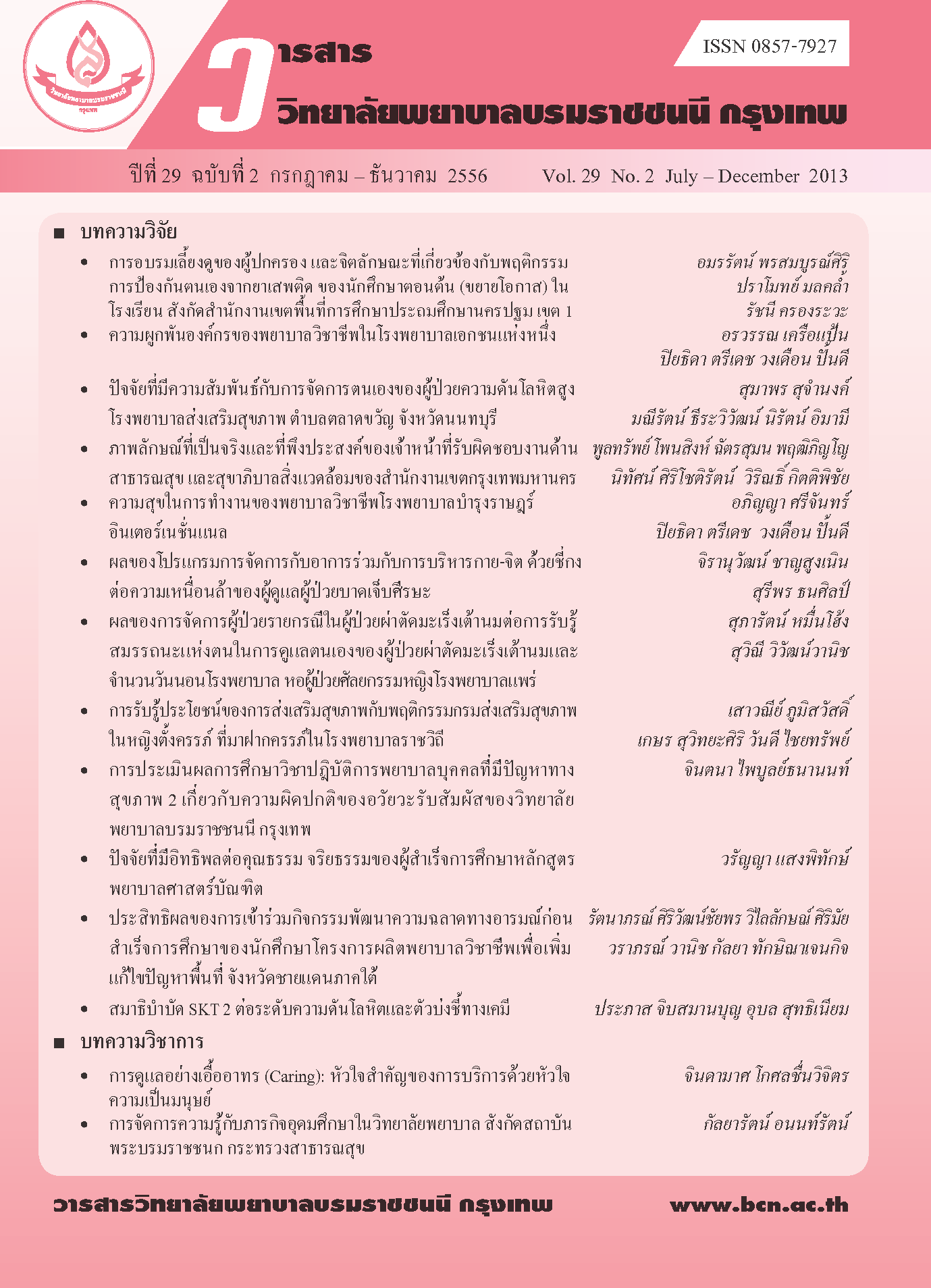ประสิทธิผลของการเข้าร่วมกิจกรรมพัฒนาความฉลาดทางอารมณ์ ก่อนสำเร็จการศึกษาของนักศึกษาโครงการผลิตพยาบาลวิชาชีพเพิ่มเพื่อแก้ไขปัญหาพื้นที่จังหวัดชายแดนภาคใต้ Efficiency of the Emotional Quotient Development Program on Nursing Students Before Graduation Under
คำสำคัญ:
กิจกรรมพัฒนาความฉลาดทางอารมณ์, นักศึกษาพยาบาล, โครงการผลิตพยาบาลวิชาชีพเพิ่มเพื่อ, แก้ไขปัญหาพื้นที่จังหวัดชายแดนภาคใต้, Emotional quotient development program, nursing students, the project of additionally producing nurses forบทคัดย่อ
บทคัดย่อ
วัตถุประสงค์ของการวิจัยครั้งนี้เพื่อศึกษาประสิทธิผลของการเข้าร่วมกิจกรรมพัฒนาความฉลาดทางอารมณ์ก่อนสำเร็จการศึกษาของนักศึกษา โดยคัดเลือกกลุ่มตัวอย่างจากอาสาสมัครนักศึกษาโครงการผลิตพยาบาลวิชาชีพเพิ่มเพื่อแก้ไขปัญหาพื้นที่จังหวัดชายแดนภาคใต้ ซึ่งเรียนในชั้นปีที่ 4 วิทยาลัยพยาบาลบรมราชชนนี กรุงเทพ จำนวน 14 คน เครื่องมือที่ใช้ในการวิจัยประกอบด้วย ชุดกิจกรรมพัฒนาความฉลาดทางอารมณ์จำนวน 8 กิจกรรมและ แบบประเมินความฉลาดทางอารมณ์ของกรมสุขภาพจิต 52 ข้อ วิเคราะห์ข้อมูลเชิงปริมาณโดยเปรียบเทียบคะแนนความฉลาดทางอารมณ์ ก่อนและหลังการเข้าร่วมกิจกรรมด้วยสถิติร้อยละ และวิเคราะห์เนื้อหาเชิงการประเมินผลของชุดกิจกรรมพัฒนาความฉลาดทางอารมณ์ตามความคิดเห็นของผู้ร่วมกิจกรรม จากการสัมภาษณ์แบบกลุ่มเน้น ผลการเปรียบเทียบระดับคะแนนรายด้านของผู้ที่เข้าร่วมกิจกรรม พบว่าผู้ที่มีระดับคะแนนรายด้านต่ำกว่าเกณฑ์ปกติ เมื่อเข้าร่วมกิจกรรมแล้วทุกคนมีระดับคะแนนสูงขึ้นเป็นระดับคะแนนปกติและสูงกว่าปกติทุกราย (ร้อยละ100)
Abstract
The purpose of this research was to study an efficiency of the Emotional Quotient Development Program on nursing students before graduation by sampling from the voluntary students under the project of additionally producing nurses for southern region of Thailand. The samples were 14 senior students from the Boromarajonani College of Nursing, Bangkok. The research tools were consisted of the Emotional Quotient Program with 8 activities and the Emotional Quotient Assessment Questionaire of the Mental Health Department comprising 52 items. The quantitative analysis method was used by comparing percentages of the Emotional Quotient scores before and after participation in the Program. The qualitative analysis for the Program assessment was also conducted via the focus group interview. The comparative results of the score of each item revealed that after participating in the Program activities, all students having lower score than normal standard gained higher scores to normal and above normal standard (100 percent).
Downloads
เผยแพร่แล้ว
How to Cite
ฉบับ
บท
License
บทความที่ได้รับการตีพิมพ์ เป็นลิขสิทธิ์ของวารสารวิจัยสุขภาพและการพยาบาล (วิทยาลัยพยาบาลบรมราชชนนี กรุงเทพ) ไม่สามารถนำไปตีพิมพ์ซ้ำในวารสารฉบับอื่น

















